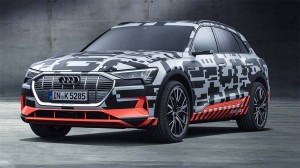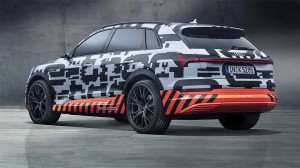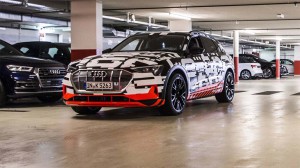While it is only now preparing to launch its first long-range battery-electric vehicle, a variation on its Q5 SUV theme, Audi is laying out ambitious sales plans for its electrified line-up, starting with the August debut of its E-Tron SUV on Aug. 30.
The automaker this week said it intends to sell 800,000 battery-based vehicles, models ranging from conventional hybrids to long-range, all-electric offerings. It is expected to offer some form of electrified powertrain for essentially future models and will use two different platforms designed specifically to take the best advantage of battery power.
The announcement comes even as Audi continues to struggle with problems related to the broader cheating on diesel emissions tests by parent Volkswagen Group. VW’s largest luxury group this week alerted German regulators that they had found problems involving 60,000 more diesel-powered vehicles.
Audi has offered a number of hybrid models in recent years but will only unveil in August its first all-electric model, the Q5-sized E-Tron. The battery-SUV will be fitted with a 95 kilowatt-hour lithium-ion battery, just slightly smaller than the largest optional pack offered for the Tesla Model X ute. Audi claims that the E-Tron will deliver around 400 kilometers, or roughly 250 miles, of range based on real-world conditions, though the final U.S. EPA numbers won’t be released for some time.
(Audi recalling 1.2 million vehicles due to fire risk. Click Here for the story.)
The automaker also plans to give a boost to demand in Europe by helping subsidize a network of high-speed charging stations. In the U.S., the parent company is investing $2 billion to help promote electrification as part of a settlement reached with U.S. and California authorities. Dubbed Electrify America, it will also set up high-speed chargers across the country, including hundreds at Walmart stores adjacent to major freeways.
“Range anxiety,” as well as the ability to charge away from home have been billed as two of the biggest concerns by potential EV buyers, though a newly released study by AAA this week found that 20% of American motorists now say they’d like their next vehicle to be an EV, up from 15% just a year ago. The increasing availability of long-range models like the E-Tron and Tesla Model 3, as well as quicker charging and declining prices, are getting credit for that public warming.
But industry analysts still question how fast words will translate into deeds. Despite a big jump in demand, automakers collectively sold only about 100,000 battery-electric vehicles in the U.S. last year, or less than 1% of the total market. Add hybrids and plug-ins and the total still came to less than three percent. But demand appears to be rising in Europe, and new regulations in China, the world’s largest automotive market, should spur a burst of interest in plug-in hybrids and all-electric models, according to analysts. And Audi is that market’s largest luxury brand.
Officials with the German marque aren’t saying precisely how their projected 800,000 electrified vehicles will break down by segment. Last year, it sold approximately 16,000 battery-based models, including three plug-in hybrids, or PHEVs. That’s less than 1% of the brand’s global sales of 1.88 million vehicles last year.
(Audi’s bringing Sport-y back with new RS 5 Sport Back. Click Here for the story.)
Audi plans to have 20 electrified vehicles in its fleet by 2025, many of them based on the MEB modular architecture developed by VW. The mainstream Volkswagen division plans to launch a new sub-brand, VW I.D., specifically for battery-electric vehicles. Meanwhile, Audi will also make use of a more upscale modular architecture it will share with sibling luxury brands such as Porsche and Bentley.
The entire Volkswagen Group was slow to enter the battery segment, preferring until recently to focus on diesel-powered products that accounted for more than half of its European sales. That changed dramatically when, in September 2015, the U.S. Environmental Protection Agency revealed VW had rigged vehicles using its 2.0-liter diesel engine to illegally pass emissions tests. A similar defeat device was subsequently found on the 3.0-liter turbodiesel used by a number of Audi products.
This week, the luxury brand alerted German automotive regulatory authorities, known as the KBA, that a previously undiscovered rigging system was in use on about 60,000 of its A6 and A7 models.
“The KBA has requested a hearing on suspicion the Audi V6TDI A6/A7 models have been fitted with an illegal defeat device,” Germany’s Transport Ministry said Tuesday. None of those vehicles are believed to have been sold in the U.S.
(To see how Audi was forced to deal with diesel emission problems, Click Here.)
So far, the Volkswagen Group has spent about $30 billion in repairs, buybacks, settlements and fines as a result of the diesel scandal. It is investing tens of billions more to develop its broad array of battery-based models.




This is truly silly – the emissions avoided was insignificant – paying $30 billion is nothing more than govt ripping off the automakers/consumers.